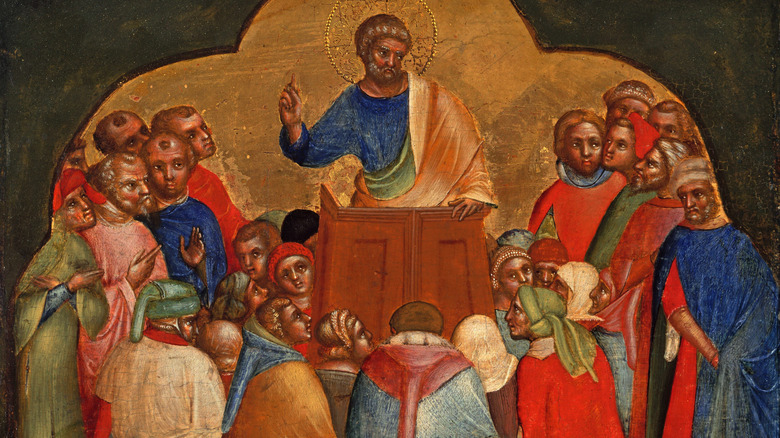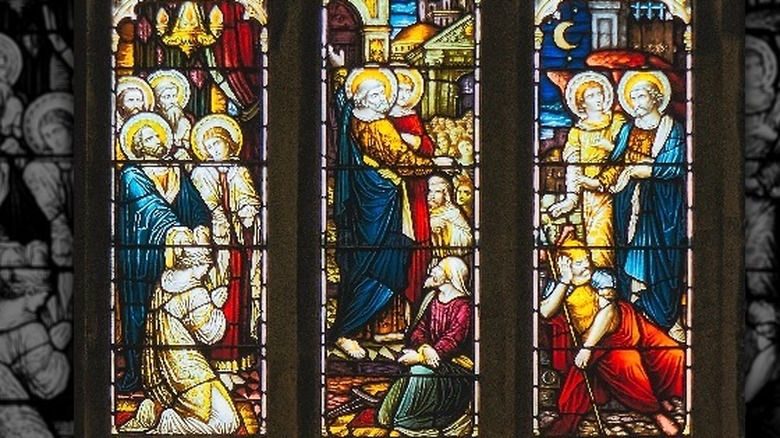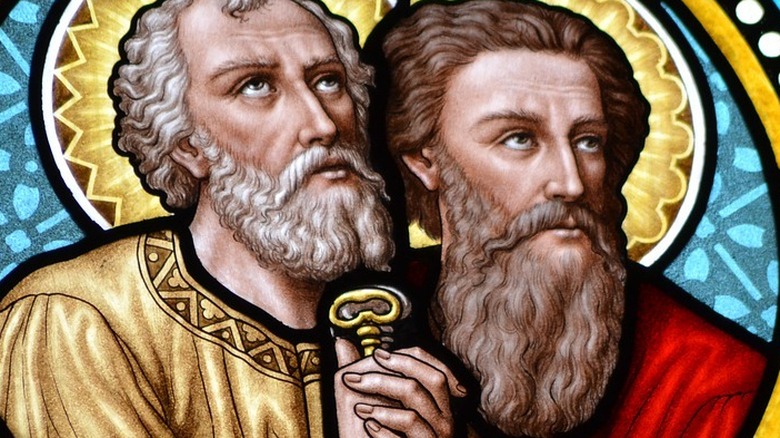The Untold Truth Of The Acts Of The Apostles
Long before domed cathedrals and bejeweled monuments to saints were ever built, the Vatican was still the site of a former circus where those very same saints were fed to lions (via "Rome: A Pilgrim's Guide to the Eternal City"). The New Testament was a scattered genre of loosely-related gospels in which devotees advocated for their own theologies or conveyed their community's lore, and a group of less than several hundred men was arguing about how to found a religion, or if they were even supposed to (via "How the New Testament Was Created").
In the late first or early second century, a new addition to the genre was written: the book we now know as the Acts of the Apostles. It became the fifth book of the New Testament Bible and the basis for the Christian model of evangelism (via "In Search of Ancient Roots: The New Testament and the Evangelical Identity Crisis"). It also offered a version of the early Church's story and a model framework of action for new converts to reference when faced with tough questions about their beliefs (via "The Acts of the Apostles: An Introduction and Commentary"). These beliefs, at the time, were hardly set in stone. What should Jesus' followers do while awaiting his return? And what was the significance of the "gospel"?
The first attempt to answer that question, through narrative rather than commandment, was the Book of Acts (via "The New Testament in Its Literary Environment"). However, the version of Acts we know today has a historically rich and surprisingly complicated backstory.
The author didn't name it The Acts of the Apostles
The Greek word for "acts" ("práxeis") only appears once in the book, and it's unlikely that "Acts of the Apostles" was the name the author gave the text. The anonymous author described their own work as an "orderly account" or "narrative," a type of work referred to as "diēgēsis" (via The Oxford Encyclopedia of the Books of the Bible), and named it accordingly. An exact translation of the name does not exist, but it is roughly akin to "narrative." Despite the author's intent to align their work with "orderly accounts" or histories, the name didn't stick.
Instead, the text picked up its name from "praexis literature," a genre of biographical "history" that was popular in Late Antiquity (via "The New Testament in Its Literary Environment"). These works depicted the extraordinary acts or deeds of a prominent figure, narrating a sequence of events according to the formulaic structure used in Calisthenes' "Acts of Alexander," Sosylus' "Acts of Hannibal," and Augustus' self-authored obituary "the Acts of Augustus". The anonymous author's text was not too different from this popular genre, and people began referring to the work as "Praexis apostolon," or the "Acts of the Apostles." In the second century, the Greek bishop Irenaeus referred to the text as "Praexis apostolon" in his treatise "Against Heresies" (via New World Encyclopedia), and it's been formally known by that name ever since.
There are different versions of the text, and scholars debate which one is authentic
Although scholars estimate the Acts of the Apostles was written sometime between 70-90 A.D., there are two known versions of the manuscript. The Western version, dated to approximately the fourth century, is longer than the other and includes more passages on the Holy Spirit. It also speaks more harshly of Jesus' followers' rejection by the Jews (via "The Number of Variants in the Greek New Testament: A Proposed Estimate"). The other version, the Alexandrian manuscript, is dated to approximately the sixth century, although it includes clippings of other texts from as early as the second century. This slightly briefer version is the one included in the modern New Testament.
There are also the Apocryphal Acts of the Apostles, and they are considered vital historical documents (via The Journal of Theological Studies). However, the Council of Nicea did not choose to include these texts in the canonical New Testament (via "New Testament Apocrypha" and Eusebius' writings in "Ecclesiastical History").
There are many theories about the identity of Theophilus
Like the Gospel of Luke, the Acts of the Apostles begins (via Biblia by Faithlife) by addressing someone named Theophilus. Who is Theophilus? Historians don't have a definitive answer. The name Theophilus comes from the Greek word "theophilos," meaning "loved by God" or "friend of God" (per Bible Info).
In the Gospel of Luke, the author addresses them as "most excellent Theophilus" (Luke 1:1-4), so some have theorized Theophilus was a prominent figure or perhaps a Roman official. In "A New Theophilus," one scholar went so far as to create persona profiles for the figure's possible identities.
According to The Biblical Archaeologist's "New Greek and Coptic Gospel Manuscripts," the Ethiopian (or Coptic) church tradition says Theophilus was a Jew living in Alexandria, Egypt. Others think "Theophilus" may have simply been a manner of addressing all readers, since the name literally translates to mean "friend of God."
The Acts of the Apostles' focus on evangelism is unique
The Acts of the Apostles recounts numerous conversions, including a mass conversion of Jews, and three missionary journeys (via "The Theology of the Acts of the Apostles"). As noted in the account of Jesus' Ascension (Acts 1:8), Jesus' last words before ascending into heaven urge his followers to go preach to the world: "But you will receive power when the Holy Spirit comes upon you. And you will be my witnesses, telling people about me everywhere — in Jerusalem, throughout Judea, in Samaria, and to the ends of the earth."
The emphasis on evangelism, or "spreading the gospel," was perhaps the key thematic element unifying the Acts of the Apostles, and many scholars say the text itself was written to provide a narrative guide proselytizers could use when talking to potential converts. The Book of Acts addresses questions like the role of the Jewish law for non-Gentiles, as well as recounting miracles or occurrences that were central to the early church, which would be more useful for those formulating a narrative script than any outsider attempting to study the church's relatively complex history, a view recounted by I. Howard Maxwell in "The Acts of the Apostles: An Introduction and Commentary."
It may have been written to 'rehabilitate' the Apostle Paul's image
The Acts of the Apostles depicts an internally harmonious early church, despite the fact that other New Testament writings, including the Epistle to the Galatians and the Second Letter to the Corinthians, indicate the early Christian church was rife with conflict — particularly between followers of the apostle Peter and followers of the apostle Paul (via "Essays on the Acts of the Apostles"). In fact, the Acts of the Apostles' portrait of a unified church with a singular doctrine is in such stark contradiction to other contemporary accounts that some scholars believe the author may have had political motives for writing it, as Carl R. Holladay notes in "A Critical Introduction to the New Testament."
Ferdinand Baur, a 19th-century scholar, argued that Acts may have been written to "rehabilitate" the image of the apostle Paul. In "Paul: The Apostle of Jesus Christ, His Life and Works," he claims the author was advocating for a new kind of "unified orthodoxy," aligning the Pauline sects and the followers of Peter so they could form a strong, singular opposition to a group called the Marcionites (per "Marcion and Luke-Acts: A Defining Struggle"). (Marcion was a religious heretic.)
The Acts of the Apostles' anonymous authorship is not the only mystery of the text, but its depiction of the early church is a valuable source for unpacking all we don't know about early Christian history.





